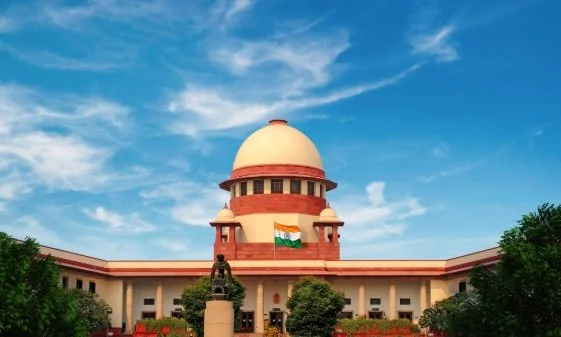Why Shoe Thrown at CJI Over Idol Remark is Disturbing
Rigid Religious Identity Seems to Be Challenging Democratic Norms
October 7, 2025
A lawyer who threw a shoe at Chief Justice of India B.R. Gavai inside the courtroom after his public interest petition was dismissed has said he does not regret it. His unapologetic stance suggests the act was not a sudden emotional reaction. It appears to reflect ideological absolutism, the belief that one’s views are unquestionable, which can lead individuals to defy democratic norms, justify disruption in the name of faith and assume public support for such behaviour.
The petition, filed by Advocate Rakesh Kishore sought the reconstruction of a damaged idol of Lord Vishnu at a temple in Khajuraho, Madhya Pradesh. “The CJI mocked it and said – go and pray to the idol and tell it to restore its own head... When a matter related to our Sanatan Dharma comes up, SC passes such orders. Don’t provide relief to the petitioner, but don’t mock him either... I was hurt... I was not inebriated; this was my reaction to his action... I am not fearful. I don’t regret what happened,” The Times of India quoted Kishore as telling ANI.
Kishore also said he had “not been able to sleep since 16 September” when Justice Gavai made the remarks, as reported by BBC.
Kishore’s words betray a clear binary: that matters relating to Sanatan Dharma are not just sacred but also immune to judicial commentary that appears dismissive. His response, he suggests, was not spontaneous or fuelled by temporary emotion. Rather, he claims it followed days of torment and moral injury after hearing what he perceived as the mocking of Hindu belief by a constitutional authority. The idea that he “had not been able to sleep” since the CJI’s comment indicates a psychological state known as “rumination,” a loop of obsessive thought common in identity-threat situations, where individuals feel their core beliefs or group affiliations have been disrespected.
The act of throwing a shoe can be seen as a form of symbolic protest. In many cultures, including India, it is meant to insult and humiliate rather than cause harm. Psychologically, it gives the protester a way to express feelings of hurt or powerlessness in a dramatic, public way. In Kishore’s case, the act targeted both the Chief Justice and the Supreme Court, which he believed had shown disrespect towards a matter of faith. Such acts are deeply problematic as they attack the dignity of public institutions and can normalise the use of personal outrage to challenge legal authority.
Kishore’s reaction shows a strong “identity fusion,” where he sees no difference between himself and the religious group he belongs to. He took the judge’s remark not as a comment on a case, but as a personal insult. Such thinking often leads to “moral absolutism,” where people believe any attack on their group identity is also an attack on them, and must be responded to strongly. The fact that he acted this way inside a courtroom, a place that depends on respect and order, shows he placed his own sense of hurt above the rules and values of the institution.
His lack of remorse is also telling. The statement “I don’t regret what happened” suggests that the action was ideologically rationalised. In political psychology, this is known as “sacralised outrage,” where people treat certain values or symbols as sacred, and feel that any insult to them must be punished, no matter the cost. In such cases, even small criticisms can feel like betrayal. Kishore’s repeated mention of “Sanatan Dharma” shows that his protest was not just personal, but tied to a larger religious identity. This kind of thinking shuts down reasoned debate, treats disagreement as offence and encourages people to act outside the boundaries of law and democracy.
From a security and institutional psychology perspective, the incident shows gaps in courtroom safety and the pressure judges face in a deeply divided society. The Chief Justice’s choice to continue the hearing calmly was a way to show that the court remains steady and in control. But the judiciary’s silence on the larger issue of religious sensitivity in public life may be seen in two ways, either as a careful effort to stay neutral or as a decision to avoid a difficult conversation.
What stands out in this case is a deeper problem in political discourse. The space for rigid, non-negotiable identities is growing, and humiliation is seen both as the injury felt and the method of retaliation.
In situations where courts must deal with cases involving both legal questions and religious belief, even comments meant as light or routine, such as irony, satire or dismissal, can trigger strong political reactions.
The incident did not take place in isolation. It reflects a shift where religion has become more visible in public life and political debate. This is not a problem by itself. But issues linked to religion today often carry sharp communal tones, where one group’s beliefs are used to question or sideline others. In such a climate, anger over perceived insults to faith can quickly turn into public outrage, and even routine legal remarks may be seen as attacks. Protest, when influenced by this mood, can take aggressive forms that claim moral authority but break the rules of democratic conduct. As religious identity becomes more rigid and demands for respect silence disagreement, the space for shared dialogue continues to shrink.
You have just read a News Briefing by Newsreel Asia, written to cut through the noise and present a single story for the day that matters to you. Certain briefings, based on media reports, seek to keep readers informed about events across India, others offer a perspective rooted in humanitarian concerns and some provide our own exclusive reporting. We encourage you to read the News Briefing each day. Our objective is to help you become not just an informed citizen, but an engaged and responsible one.

